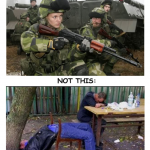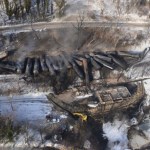Security
This is very simple, and it has more to do with the philosophy and marketing of operating systems than the technology of the operating systems themselves, though the technology does matter a great deal as well. First, lets have a look at how this ransomware attack was allowed to happen to begin with.
The vast majority of affected systems in this latest world wide cyber attack were Windows based computers that were not updated with recently available and easily deployed patch. The attack did not affect other operating systems, and Windows systems that had a recently released security patch…
The terrorists have defeated the railroads, and by extension, the people. Well, not totally defeated, but they won a small but important battle.
We have a problem with the wholesale removal of petroleum from the Bakken oil fields, and the shipping of that relatively dangerous liquid mainly to the east coast on trains, with hundreds of tanker cars rolling down a small selection of tracks every day. I see them all the time as they go through my neighborhood. These trains derail now and then, and sometimes those derailments are pretty messy, life threatening, and even fatal.
There has been…
My whole housing development recently changed Internet Service Providers. We now have optical fibre from Ownit, offering hundreds of megabits per second. It works just fine. But there's a security issue and Ownit aren't taking it seriously.
All over Sweden, Ownit are deploying wifi routers that work out of the box. If you want to change any settings on your router (such as the name of the access point or the wifi password), you'll find a URL in the manual which brings up a set of admin menus. Same URL on all their routers. All over Sweden.
Actually, Ownit holds the password to the “admin”…
American Public Media's Marketplace program is taking a look at "the economic legacy of 9/11" this week, and this morning's story focused on security spending in the private sector. Marketplace's Jeff Horwich highlighted an unexpected example: security for grain elevators.
For you city-folk, grain elevators are America's rural skyscrapers. Farmers dump their corn, wheat, soybeans. Trucks haul it out to feed the country. Even though elevators are mostly in the middle of nowhere, Bob Zelenka of the Minnesota Grain and Feed Association says you never know.
Bob Zelenka: It's on the edge of town…
The saying "demography is destiny" reportedly dates back to 19th-century social scientist Auguste Comte, and it's still popular among journalists. Earlier this year, for instance, Alan Wheatley of Reuters warned about the challenges Asian countries (especially Japan) will face as over-60 residents make up ever-larger shares of their populations. His article also touches on the challenges for countries that face the opposite problem: a large proportion of young residents, or "large cohorts of angry, unemployed young men" prone to causing turmoil.
A recent Council on Foreign Relations report…
Variations on the obligation to love one's neighbor show up across both the religious and secular spectrum. They tend to provoke a range of responses - from those who attempt to sort out what loving people who are not part of your immediate tribe would mean, to those who reject the necessity. This is not an easy idea - and even if you can sort out what it means to love people who you may not know well, or like much, or even trust, or know how to get to knowing, liking and trusting - it is a damned hard thing to put into practice. I want to talk a bit more about why even use the word love,…
If Your Password Is 123456, Just Make It HackMe:
Back at the dawn of the Web, the most popular account password was "12345."
Today, it's one digit longer but hardly safer: "123456."
Despite all the reports of Internet security breaches over the years, including the recent attacks on Google's e-mail service, many people have reacted to the break-ins with a shrug.
According to a new analysis, one out of five Web users still decides to leave the digital equivalent of a key under the doormat: they choose a simple, easily guessed password like "abc123," "iloveyou" or even "password" to protect…
tags: airline security, homeland security, Umar Farouk Abdulmutallab, Lagos Murtala Muhammed International Airport, LOS, President Obama, politics
Helping Airport Security: Fly Naked.
(orphaned image)
By now, you all are aware that yet another privileged young extremist man, 23-year-old Nigerian Umar Farouk Abdulmutallab, boarded an airplane bound for the United States with the intention of blowing the plane up and in doing so, ending hundreds of innocent civilian lives. If you know that, then you also know that several passengers and the authorities caught Abdulmutallab as he tried to…
Medical institutions in the US northeast have always been competitive, and Harvard has always been toward the top of the list in that category. I don't mean just competitive to get into. I mean competitive, period. I went to another big research medical school in the northeast in the sixties and we used to joke that at Harvard if someone put on his dorm light (it was pretty male in those days) in the middle of the night to go to the bathroom, all the other lights on the floor would go on, too, on the theory someone was getting ahead of them. Put that down to prestige envy, perhaps, but as a…
What moves human beings to innovate measures of security? History will tell us that the most inventive and industrious times are fraught with warfare, uncertainty, and widespread fear. Greg Laden, a longtime ScienceBlogger, helps tackle this topic this month on the new Collective Imagination blog with Peter Tu, a systems design engineer who has developed algorithms for the FBI Automatic Fingerprint Identification System, and is the principle investigator for the ReFace Program at the Visualization and Computer Vision Group at the GE Global Research Center. Greg and Peter discuss the important…
tags: Gordon Brown, world wide web, WWW, social injustice, poverty, security, climate change, economy, ethics, streaming video
We're at a unique moment in history, argues UK Prime Minister Gordon Brown: we can use today's interconnectedness to develop our shared global ethic -- and work together to confront the challenges of poverty, security, climate change and the economy [16:43]
TEDTalks is a daily video podcast of the best talks and performances from the TED Conference, where the world's leading thinkers and doers give the talk of their lives in 18 minutes.
We've had occasion to discuss the boondoggle, Project Bioshield a number of times (here, here, here, here, here, here, here, here). Maybe I should have said, quite a number of times. REally, though, it's hardly worth mentioning. Via the Clinician's Biosecurity Briefing, this:
The Project BioShield Act, passed in 2004, gives HHS "authorities to expedite research, development, acquisition, and availability of priority medical countermeasures for public health emergencies caused by terrorist attacks." This Congressionally mandated report covers progress on the uses of those authorities for the…
The art professor is finally cleared but a distinguished biologist was still punished by a ridiculous, mindless, cruel and utterly reckless use of raw power by the Bush administration:
A federal judge dismissed criminal indictments on Monday against an art professor at the State University of New York at Buffalo who was charged four years ago with mail and wire fraud after receiving bacteria through the mail that he said he planned to use in his art projects.
Judge Richard J. Arcara of the U.S. District Court in Buffalo ruled that the indictment against the professor, Steven J. Kurtz, was "…
The Global War on Terror is claiming yet another victim: the reputation of Attorney General Michael Mukasey as a principled guardian of the Rule of Law. Even before joining the Bush administration Mukasey was forgetting the meaning of the word "torture," and since being confirmed is equally benighted regarding privacy. Now he is peddling shoddy goods linking terrorism and software piracy. Does this former judge have no shame? Via Preston Gralla at Computer World Blogs:
In a talk last week before at the Tech Museum of Innovation, Mukasey used his best fearmongering tactics to link software…
Carnegie-Mellon is a great university and when it comes to robotics and computer science is always on the cutting edge. But does that cutting edge have to be so sharply lethal?
Unmanned aircraft are showing up in the skies more often and today the US Army awarded $14.4 million to Carnegie Mellon to build a remote-controlled unmanned tank.
A certain amount of the award will go toward significantly improving the Crusher, a 6.5-ton unmanned support vehicle Carnegie engineers developed in 2006 in conjunction with DARPA. Since its introduction, the Crusher has demonstrated unparalleled toughness…
Dear Leader is away in Australia, visiting his lapdog, Oz Prime Minister John Howard and attending the Asia-Pacific economic (APEC) summit. At the summit he chatted easily with his soulmates:
U.S. President George W. Bush on Thursday told reporters that talks with Chinese President Hu Jintao were "constructive" and centered on Iran, China-made product recalls, global climate change and civilian religious freedoms.
"He's an easy man to talk to. I'm very comfortable in my discussions with President Hu," Bush said. (CNN)
Whatever.
But the main story doesn't seem to have made it into the US media…

